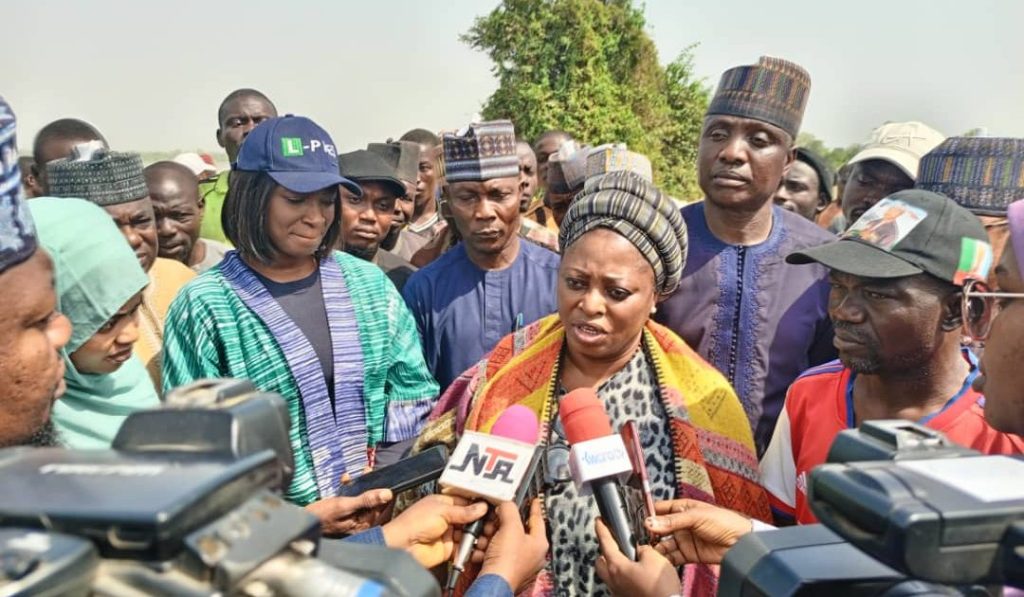The tranquil agricultural landscape of Shonga, in Kwara State, Nigeria, has been shattered by a devastating and unexpected flood, submerging thousands of hectares of rice farms and leaving a trail of economic ruin. The timing of the deluge is particularly perplexing, occurring during a dry spell with no recorded rainfall in the region, raising immediate concerns about its origin and prompting calls for a thorough investigation. The flood’s impact transcends local boundaries, affecting farmers from across northern Nigeria who had invested in Shonga’s fertile lands, cultivating vast rice paddies that contribute significantly to the nation’s food security. The incident has cast a pall of uncertainty over the future of these agricultural ventures and the livelihoods they support.
Kwara State Governor AbdulRahman AbdulRazaq has responded swiftly to the crisis, establishing a high-level committee to delve into the circumstances surrounding the unusual flooding. The committee’s mandate includes a fact-finding mission to the affected areas, assessing the extent of the damage, and delivering a message of condolence and support to the Emir of Shonga and the impacted communities. This proactive approach underscores the gravity of the situation and the government’s commitment to addressing the immediate needs of the victims while seeking long-term solutions to prevent future occurrences.
The Emir of Shonga, Dr. Haliru Yahyah Ndanusa, expressed his profound shock at the unprecedented nature of the flood, highlighting the anomaly of its occurrence during a period of drought across the Sahel region. He emphasized the urgency of identifying the source of the flooding to safeguard the region’s agricultural productivity and food security. Preliminary inquiries have directed suspicion towards the Jebba Dam, with reports suggesting the release of water from the dam may have contributed to the inundation. While Kainji Dam has been ruled out as a potential source, the Emir urged the state government to investigate whether the Jebba Dam’s water release was authorized and to implement measures to prevent similar incidents in the future.
Adding weight to the Emir’s concerns, community leaders in the affected areas revealed the widespread impact of the flooding, affecting farmers from several northern states, including Kebbi, Zamfara, Kano, and Niger, who had invested heavily in rice cultivation in Shonga. These farmers now face substantial losses, potentially jeopardizing their livelihoods and contributing to a regional food security crisis. The magnitude of the damage underscores the importance of swift government intervention and the need for a comprehensive strategy to mitigate the economic fallout and support the affected farming communities.
As part of the immediate response to the disaster, a government delegation led by the Deputy Chief of Staff, Princess Bukola Babalola, visited the affected community of Tada to assess the damage firsthand and deliver relief materials worth millions of naira to the impacted farmers. Babalola reiterated the government’s commitment to finding both immediate and long-term solutions to the crisis, assuring the victims of continued support. This on-the-ground assessment provides crucial information for the government’s response plan and demonstrates a commitment to working closely with the affected communities.
The flooding in Shonga serves as a stark reminder of the vulnerability of agricultural communities to environmental disasters and the interconnectedness of regional food systems. The incident highlights the need for proactive measures to manage water resources, strengthen infrastructure, and develop effective disaster preparedness and response mechanisms. As the investigation unfolds, it is crucial to establish the root cause of the flooding and implement appropriate measures to prevent future occurrences, ensuring the long-term viability of agriculture in the region and protecting the livelihoods of those who depend on it. The estimated loss of millions of naira worth of rice crops underscores the economic significance of this disaster and the urgent need for a comprehensive and sustainable solution. The call for dredging the River Niger, voiced by community leaders, represents a potential long-term measure to improve water management and mitigate the risk of future flooding.














